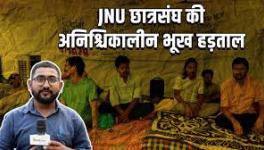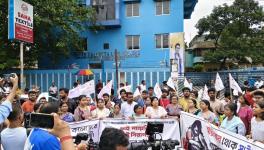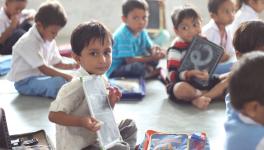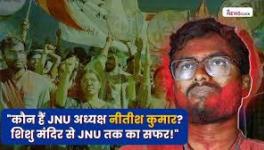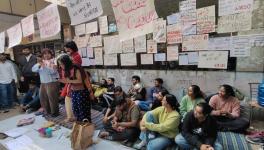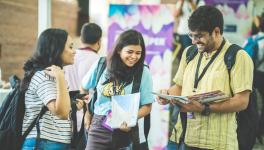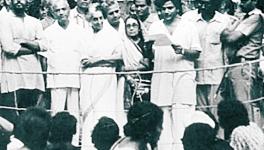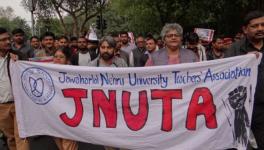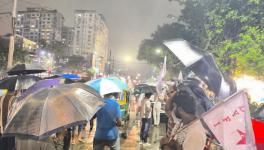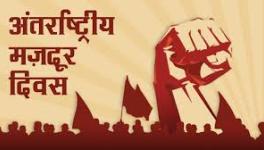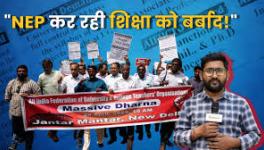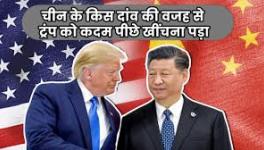United Left Records Massive Win in JNU Students Union Elections
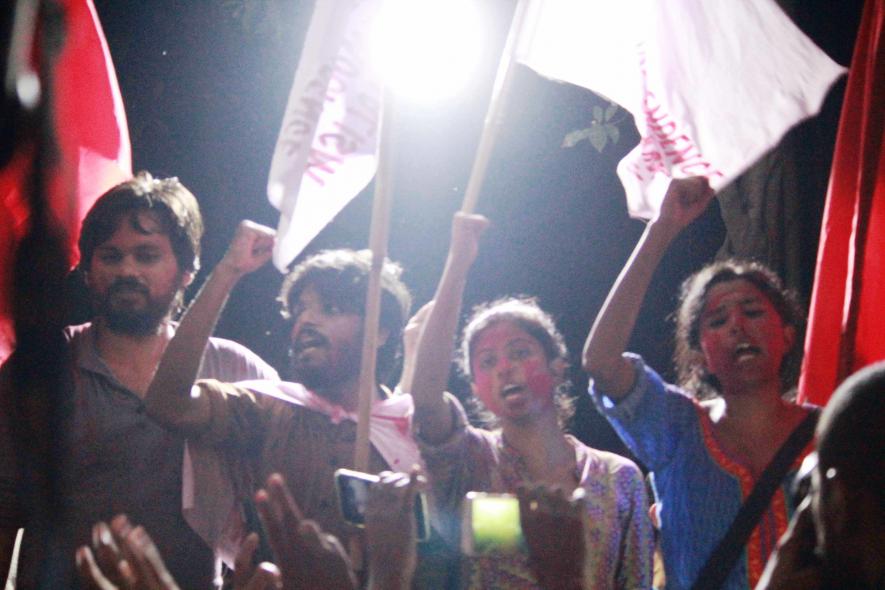
The victorious United Left candidates (from Right to Left): Geeta Kumari, Simone Zoya Khan, Duggirala Srikrishna and Shubhanshu Singh.
The United Left has won a mammoth victory in the JNU Students Union (JNUSU) elections for the year 2017-18. The alliance won all four office-bearer posts in the Union – President, Vice-President, General Secretary and Joint Secretary – by huge margins.
The United Left, an alliance of three left-wing student organisations – All India Students Association (AISA), Students’ Federation of India (SFI), and Democratic Students Federation (DSF) – also won 13 councillor seats in the Union and a majority in the JNUSU Council.
Geeta Kumari from AISA won the President post by a majority of 464 votes, while Simone Zoya Khan from AISA won as Vice-President by 848 votes. Duggirala Srikrishna from SFI was elected as General Secretary by a margin of 1107 votes, and Shubhanshu Singh from DSF won the Joint Secretary post by a majority of 835 votes. The four winning candidates polled 1506, 1876, 2082 and 1755 votes respectively.

Students celebrating the election victory of the United Left in JNUSU elections.
The Akhil Bharatiya Vidyarthi Parishad (ABVP), the student wing of the Rashtriya Swayamsevak Sangh (RSS), came second in all four office-bearer posts.
The Birsa Ambedkar Phule Students Association (BAPSA), which had come second in the President post in last year’s elections, suffered a setback as it was relegated to the third position in all four office-bearer posts.
The All India Students’ Federation (AISF) was faced with a major disappointment as its President candidate Aparajitha Raja finished fifth, behind the United Left, ABVP, BAPSA and independent candidate Md. Farooque Alam. Aparajitha Raja polled 416 votes. AISF candidate Kanhaiya Kumar had won the JNUSU President post narrowly – by 67 votes – in 2015-16, when the left vote splintered with SFI, AISA, DSF and AISF contesting separately.
The Congress-affiliated National Students Union of India (NSUI) suffered serious embarrassment and a severe loss of face as all four of its office-bearer candidates finished behind NOTA. NSUI’s President candidate polled 87 votes, while there were 127 NOTA votes for the post.
Polling was held on Friday, 8 September, and counting began the same night.
The first results to come out, as is usual, were those of the school councillor posts.
Independent candidates won as councillors in many of the science schools. The ABVP claimed that two independent candidates who won in the School of Life Sciences (SLS) were supported by them, while the Congress-affiliated National Students Union of India (NSUI) said that one councillor in the same school was supported by them. An independent candidate was elected unopposed in the Centre for the Study of Law and Governance (CSLG), while the ABVP candidate was elected unopposed in the Centre for Sanskrit Studies (CSS). An independent candidate won the sole councillor post in the School of Arts and Aesthetics (SAA).
The United Left swept the councillor posts in the bigger schools – the School of International Studies (SIS), the School of Social Sciences (SSS), and the School of Language, Literature and Culture Studies (SLL&CS).
In SIS, the United Left won four out of five councillor posts, as the alliance candidates Marie Pegu, Aishe Ghosh, Sarthak Bhatia and Shashi Kant Tripathi came out victorious. The remaining councillor post was won by independent candidate Prahlad Kumar Singh.
In SSS, the United Left won four out of five councillor posts, with the alliance candidates Aejaz Ahmad Rather, Satish Chandra Yadav, Shreyasi Biswas and Sudhanya Pal winning. Chepal Sherpa of the Bhagat Singh Ambedkar Students Organisation (BASO) won the remaining councillor post.
In SLL&CS, the alliance won all five councillor posts, as United Left candidates Aditi Chatterjee, Ghulam Qadeer, Parveen Sheikh, Raju Kumar and Swati Singh won comfortably.
Counting for the central panel (the office-bearer posts) began with the science schools and smaller schools. The ABVP has been traditionally stronger in the science schools, and polled the highest number of votes in these schools.
Counting for SIS began around the same time, and United Left candidates won large majorities in the school.
As complete results came in for the ‘combined schools’ (science schools and smaller schools) and SIS, the United Left was trailing behind ABVP by 25 votes in the President post. United Left candidates in the Vice-President and Joint Secretary had narrow overall leads of 19 and 9 each. Duggirala Srikrishna, the General Secretary candidate was, however, far ahead already with a lead of 283 votes. Srikrishna, the incumbent Convenor from SIS, and whose work in the Union in the past one year has been widely appreciated, won a whopping 483 votes out of 829 votes in his school.
As results from ‘Red Fort’ School of Social Sciences (SSS) started coming in, the United Left raced ahead. The ABVP’s President candidate managed to win only 127 out of 1270 votes in SSS, historically a stronghold of the Left. Results from the largest school SLL&CS – with 1469 polled votes – were the last to be declared, and the United Left candidates increased their majorities to finish well ahead of their opponents.
The ABVP has won a majority in the JNUSU only once – in 1996-97, when it won the Vice-President, General Secretary and Joint Secretary posts and a large number of councillor seats. It has won the President post only once, in 2000-01, when the ABVP candidate won by just one vote. The very next year, however, the SFI-AISF alliance swept the polls, with the ABVP being trounced in all seats by huge majorities (the SFI-AISF’s President candidate won by 589 votes, then a record).
Ever since then, the ABVP has managed to win a JNUSU office-bearer post only once, in 2015-16. But the ABVP has been on a back foot since then, having angered the students with its #ShutDownJNU campaign in February 2016 using doctored videos. The ABVP has also been left without answers to the questions raised by students this year, as the JNU administration – widely acknowledged to be backed by the RSS – cut nearly 1000 seats in the research programmes of the University.
Geeta Kumari is the fifth woman to become the President of the JNUSU.
Rashmi Doraiswami from SFI, elected in 1983-84, was the first woman President of the Union. Albeena Shakil, also from SFI, became the second woman President in 2001-02. Mona Das from AISA, who won two times in 2004-05 and 2005-06, and Sucheta De from AISA who won in 2011-12, were the third and fourth women Presidents of the JNUSU.
The 35-member JNUSU council consists of the Union office-bearers elected by all students in JNU, and 31 school councillors elected by students of the various schools in JNU.
The number of votes cast in the JNUSU elections came down from 5138 last year to 4620 this year due to the seat cuts that have been imposed on the University.
Get the latest reports & analysis with people's perspective on Protests, movements & deep analytical videos, discussions of the current affairs in your Telegram app. Subscribe to NewsClick's Telegram channel & get Real-Time updates on stories, as they get published on our website.










